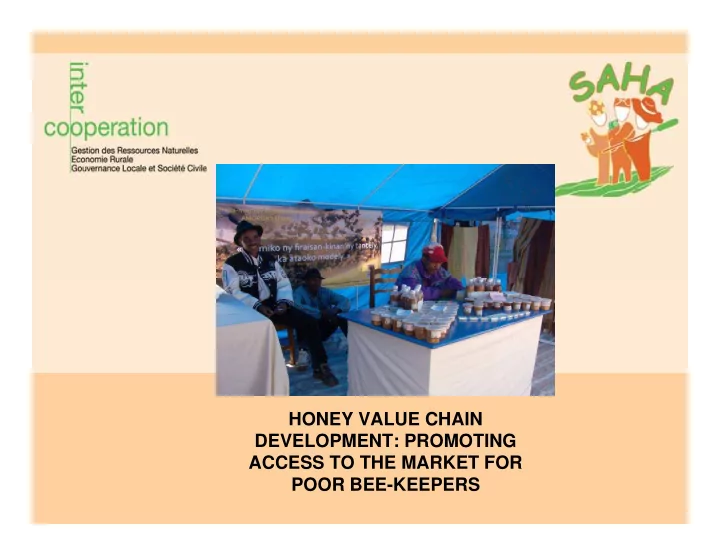

HONEY VALUE CHAIN DEVELOPMENT: PROMOTING ACCESS TO THE MARKET FOR POOR BEE-KEEPERS
������������������������ � Context and justification � The approaches used by SAHA � Market system supporting the integration of poor beekeeper � The roles of the Program � Monitoring and results � Challenges and lessons learned � The way forward
CONTEXT AND JUSTIFICATION � Development challenges in Madagascar: poverty, poor private sector organisation, limited market development, low human resource capacity, low capacity of governmental agencies, remoteness of rural areas � SAHA : Rural development program supporting farmers organizations with pro-poor focus � Farmers activities hampered by many constraints experienced by different stakeholders upstream and downstream the value chain � Honey value chain : 60% poor beekeeper using traditional techniques (1 or 2 hives), market poorly organised � Honey value chain was chosen using pro-poor criteria (no land needed, low inputs, known activity, short cycle of production…)
APPROACHES USED BY SAHA Phase I : Phase II : Phase III et IV : Support to farmers Development by Organizational support organizations at local using value chain to farmers federation level (transition from approach (upstream (representation, traditional to modern and downstream) technical services, beekeeping) market strategy, partnership…) � Integration of the poor is based on: � Support to direct partners in analysing advantages to work with poor � Development of a win - win strategy � Capacity building of direct partners to deal with this cause NB : SAHA is not a M4P program as such, but it integrates and respects the main principles of M4P
MARKET SYSTEM SUPPORT INTEGRATING POOR BEEKEEPERS Bee- Fight ASC, keeping Development against RFAD technique of leasing varroa Information system for 3 by years cellphone ������������ ��� ����� - Organi ������� ��� ���� Strategy ���� sation ��������� �������� !�������� ������������ ����������� ������������ ��������� ������������������� Collectors/ Transformers Consumers Beekeepers - Organisational Honey support "�%� processing Levying of - Production business EU support ��������� plan ����$��$� embargo, - Marketing ����� ��"#� services honey processing Improvement of local Elaboration frame conditions (environment)
ROLES OF THE PROGRAMME � Envisaged result chain Farmers Offer of Improvement Poverty organisation services to of alleviation support members productivity � SAHA does not provide services directly but finances service delivery � SAHA does not substitute the actors but collaborates with them : � SAHA does not substitute the actors but collaborates with them : decentralised local governments, local technical services, others actors… services suppliers � SAHA facilitates linkages between producers (the beekeepers) and buyers (collectors, processers) � SAHA collaborates with others stakeholders involved in the value chain
MONITORING AND RESULTS � Monitoring of behavioural changes using Outcome Mapping based on: � Participatory approach � Complementarity � Social inclusion – participation of the poor (vulnerable) � Some qualitative and quantitative impacts: � Some qualitative and quantitative impacts: � Self confidence � Social openness � Increased production from 5 l (traditional hive) to 15 l (modern hive) � Improved prices of honey from 1400 Ar / l to 7 000 Ar/ l, � Increased income NB : SAHA does not monitor impact on the market system, nor changes at the level of indirect partners – the focus is on the direct partners
CHALLENGES AND LESSONS LEARNED � Facilitation : the effectiveness of facilitation is limited by : � Poorly developed markets (private sector, services providers...) � Lack of entrepreneurial culture/ mindset � System: In order to understand changes in the market system, it is important to monitor behavioural changes amongst and between the multiple actors � Scale: The strength of SAHA lies in working at local, regional and national level – especially important in promoting a pro-poor approach � Crucial for sustainability : � Institutional maturity � Viable services for members � Strong linkages with other actors
THE WAY FORWARD � Facilitation / scale: continuation of the interventions with focus on the supports functions and rules (in the light of the phasing out of project support), thus scaling up � System: analyze the feasibility to monitor market access � Sustainability: � Sustainability: � Institutionalisation: contribution to the development of sustainable mechanisms to finance farmers’ organization as CSA/ FRDA � Capitalisation : sharing SAHA’s experiences with the integration of the poor
THANK YOU FOR YOUR ATTENTION
Recommend
More recommend